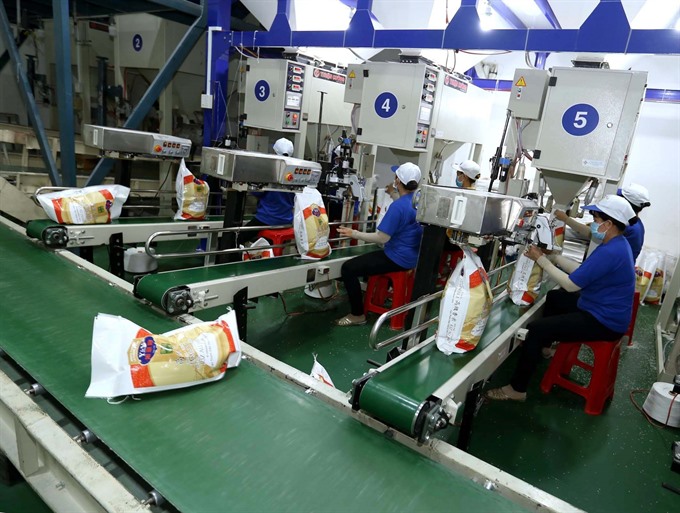 Society
Society

Agriculture plays a pivotal role in the economic, political and social stability of each ASEAN member nation and their partners in the region, Vietnamese deputy Prime Minister Trịnh Đình Dũng said in the opening speech at the 40th ASEAN Ministers of Agriculture and Forestry (AMAF) meeting which opened in Hà Nội yesterday.
 |
| Workers package rice at the Trung An Hi-tech Farming JSC in the southern city of Cần Thơ. The company exports 80,000 tonnes of rice to Japan, the Middle East, Australia and China by the end of July, generating US$38 million in revenue. — VNA/VNS Photo Vũ Sinh |
HÀ NỘI — Agriculture plays a pivotal role in the economic, political and social stability of each ASEAN member nation and their partners in the region, Vietnamese Deputy Prime Minister Trịnh Đình Dũng said in the opening speech at the 40th ASEAN Ministers of Agriculture and Forestry (AMAF) meeting which opened in Hà Nội on Thursday.
“The fact is that for most ASEAN members, agriculture has been the foundation of their economies, which has helped them overcome several changes and crises as well as contribute to food security and sustainable development,” said the Deputy PM.
“Thus, agriculture and forestry co-operation is always a key issue for the ASEAN Economic Community,” he added.
As an active member of ASEAN, Việt Nam has treasured the cooperation in the region and would further invest in human resources and research as well as propose initiatives to make contributions to sustainable agricultural development for the benefit of ASEAN people, Dũng affirmed.
In the meeting, ASEAN agriculture ministers expected to endorse strategies, policies and instructions for agricultural, forestry and fishery production in the region.
The ministers would propose cooperation initiatives with partners and international organisations to realise objectives of the ASEAN vision by 2025 and the United Nations Sustainable Development Targets by 2030.
As part of the agenda, the ministers are expected to approve 23 action plans and other documents in agricultural and forestry cooperation.
Speaking at the meeting, Vietnamese Minister of Agriculture and Rural Development Nguyễn Xuân Cường said: “The ASEAN members have favourable conditions for cooperating and forming chains of agricultural and food product supply in the region.”
However, the imbalance of production levels, human resources and technologies among members had created hurdles blocking them from common development, Cường told the meeting.
Thus, the state members should further boost cooperation and seek optimal solutions for agriculture that is green and adapted to climate change, said the Vietnamese Minister.
In the context of climate change affecting people’s lives and food security in the region, agriculture and forestry cooperation in ASEAN for the term 2018-19 should focus on four main objectives.
First, the bloc should enhance cooperation and support among members to build sustainable and smart agriculture which enables adaptation to climate changes and ensures food security.
Second, more private investment inside and outside ASEAN should be lured to develop agricultural product value chains towards a sustainable agriculture and increase added value as well as pushing ASEAN agro-products to join global value chains.
Third, public-private partnerships in agriculture, forestry and fishery production must be strengthened and the roles of the community and private sector in preparedness to climate change and food security must be enhanced.
Finally, the application of technology in agriculture, forestry and fishery production must be promoted, and agricultural and fishery extension systems via training and technology transfer activities among members should also be boosted.
With a market of more than 650 million people and a combined annual GDP of more than US$2.6 trillion, joining ASEAN has helped Việt Nam increase its trade volume with other countries in the region.
At present, agricultural trade includes key export items like rice, seafood, vegetables and fruit accounting for 30 per cent of the country’s total exports to ASEAN.
Agro-forestry-fishery products exported to ASEAN in 2017 reached $5.73 billion, of which $2.35 billion was worth of exports and $3.38 billion was worth of imports.
In the meeting, Deputy PM Dũng also called on ministers to use the ASEAN plus Three Emergency Rice Reserve Agreement (APTERR) to support the victims of the Indonesian earthquake and tsunami. — VNS




